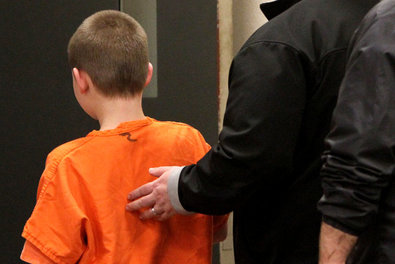
What Age Should Young Criminals Be Tried as Adults?
The governor of Connecticut has proposed raising the age juveniles can be tried as adults to 21 in attempts to keep more young people out of cycles of incarceration. Michigan, one of few states that still charge 17-year-olds as adults, is also considering raising the age for eligibility of juvenile status to 18. Is this a good idea? What age is appropriate for young law-breakers to be tried as adults?
* try = (법원에서) 심리[재판]하다/ governor = (미국) 주지사; (식민지의) 총독/ juvenile = 청소년/ in an attempt to ~ = ~하기 위하여, ~하려는 시도로/ incarcaration = 감금, 투옥/ charge = 기소하다, 고소하다/ eligibility = 적임, 적격/ appropriate = 적절한/ law-breaker = 범법자
 어린(청소년) 범법자들이 성인으로서 재판을 받기에 적절한 연령은?
어린(청소년) 범법자들이 성인으로서 재판을 받기에 적절한 연령은?
1. Raise the Minimum Age to 21
Research in psychology and neurobiology confirms that young people’s brains are not fully formed even in their mid-20s.
2. There Is No One-Size-Fits-All Age Limit
Juvenile justice systems are designed to rehabilitate young offenders, and that's good policy. But when a juvenile murders or rapes someone, it's different.
3. No Younger Than 18
Youth placed in the adult system are 34 times more likely to become repeat offenders, and often, at faster rates and more dangerous levels.
4. Raising the Age Doesn’t Lower Juvenile Crime
Policies that simply shift the "age of majority" without otherwise engaging these young offenders don't work.
Sample Essay
There Is No One-Size-Fits-All Age Limit for Who Can Be Tried as an Adult
Children and teenagers commit crimes. In many cases, they are low-level crimes, like stealing candy from a store, getting in fights or urinating in public. Sometimes the behavior is more dangerous — shooting BB guns or throwing rocks, drinking alcohol or smoking marijuana.
Though these activities are all crimes under state law, in most cases, youthful miscreants, when caught, are not processed in any court. Nor should they be: Kids do dumb things. As a compassionate society we deal with these incidents informally and use them as teaching opportunities.
More serious crimes, of course, are dealt with in the formal justice system. And, suddenly, different decisions must be made about whether a minor should be tried as an adult.
All states have unique juvenile justice systems designed to rehabilitate young offenders, and the vast majority of cases involving those under the age of 18 are processed that way. That's good policy: Juvenile justice systems are an expression of our belief as a society that virtually every youthful offender can learn from his or her mistakes and become a productive member of society.
But when a juvenile murders or rapes someone, that’s different and a much more difficult call. There is no one-size-fits-all answer, nor under our federalist system, where states handle the lion share of crimes, should there be. Some of those murderers go to juvenile court; others are rightfully treated as adults. The decision is made on a case-by-case basis and varies from state to state, depending in large part on the crime committed and the age of the offender.
Take the 2002 case of a 14-year-old girl who, with her 16-year-old boyfriend, conspired to shoot her grandfather in the face and stabbed him; shot her sleeping aunt three times; shot, stabbed, poured lighter fluid on and set fire to her grandmother; and stabbed her 10-year old sister 14 times. Or another case from 2002, that decided a 16-year-old boy from Tucson would spend his life in prison for murdering a mother and her two young children as he stole their car.
These teenagers deserved to be prosecuted in adult court. Fortunately, they are the exception when it comes to teenage criminals, not the norm.





![]() 어린(청소년) 범법자들이 성인으로서 재판을 받기에 적절한 연령은?
어린(청소년) 범법자들이 성인으로서 재판을 받기에 적절한 연령은?






